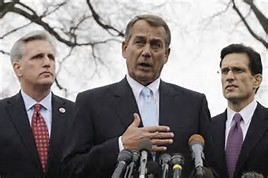Good Riddance: House Republican Leadership Goes ‘Poof’
Memo to Kevin McCarthy: Truth-Telling and GOP Politics Don’t Mix
Memo to Eric Cantor: That’s Why They Hold Elections
Editor’s Note: This article was updated on October 20, 2015
Scorecard: Cantor-done. Boehner-going. McCarthy-irrelevant. Oh, how the mighty have fallen.
The news greets me like opening a window to gentle sunshine and a whiff of sweet-scented air.
John Boehner (R-OH), Speaker of the US House of Representatives, second in line to the presidency, the perpetually tanned man with a taste for Merlot, tendered his resignation notice last month, realizing that actually governing would not sit well with the so-called “Freedom Caucus,” 50 or so right wingers (mostly southern) who apparently hold the Republican conference hostage.
Kevin McCarthy Implodes
Boehner’s exit ignited a parade of wannabe successors from all reaches of the GOP. Republicans naturally prefer an imperial, next-in-line succession, and so that would have favored current majority leader Kevin McCarthy (R-CA).
But McCarthy withdrew after violating Republican orthodoxy by telling the truth about his conference’s legislative activities. His revelation–shocking, just shocking!–that the House Oversight Committee’s investigation of Benghazi was merely a partisan witch-hunt sent McCarthy scurrying to the back bench.
It wasn’t supposed to be this way. Before his still-baffling loss in Virginia’s June 2014 primary election, Eric Cantor, the former Republican majority leader, was Boehner’s golden boy…as obvious a successor as there ever was one. We might regret Cantor’s astonishing descent. Given the shady cast of characters competing for the golden ring, Eric Cantor does seem like the proverbial adult in the room.
Cantor Waxes
Of course Cantor chimed in after Boehner’s announcement. From his corner office at Wall Street investment banking firm Moelis & Co., where he is vice chairman and managing director, Eric Cantor waxed philosophically on the September 25 op-ed page of the New York Times. He revealed that both he and Boehner shared the same vision of governance.
Regarding threats of a government shutdown, Cantor sagely instructed that change was incremental (“hail mary passes” versus “three yards and a cloud of dust”) and to say otherwise was not being honest with “fellow conservatives.”
So Cantor and Boehner were united against the hard-right bomb throwers? You could have fooled me. Each time, they folded like rickety card tables.
So What Was Behind Eric Cantor’s Clueless Meltdown?
On the morning of the Republican primary for Virginia’s 7th Congressional district, Eric Cantor was nowhere to be found in the district: a tree-lined, upper-income string of suburbs north of Richmond.
According to Politico, Cantor spent that primary morning “huddled with lobbyists at the Starbucks on Capitol Hill.” Cantor seemed to have nothing to worry about. His internal polling had him up 34 points. He had outspent his opponent, libertarian college professor David Brat, by $5 million to around $200,000 (that’s 25-1).
But, wrote the Nation, Cantor “burned through a significant amount on lavish travel and entertainment instead of election advocacy…Cantor’s PAC spent at least $168,637 on steakhouses, $116,668 on luxury hotels…and nearly a quarter-million on airfare (with about $140,000 on chartered flights).” Something tells me that much of that travel was not through the 7th district.
So what actually caused this historic electoral loss? (His is the first primary loss by a sitting House majority leader in this country’s history.) My thoughts:
Contrary to the mainstream media, it wasn’t about immigration. Yes, candidate Brat made immigration a campaign calling card, even declaring Cantor to be “the No. 1 cheerleader in Congress for amnesty.” But Brat was wrong on this one. The Times: “More than anyone else in the House, including Speaker John Boehner, Mr. Cantor was responsible for the chamber’s refusal to vote on the Senate’s immigration bill.” In any case, according to exit polling done by Public Policy Polling, about 72 percent of voters polled in the 7th either “strongly” or “somewhat” supported immigration reform.
Far from assertions of a tea party resurgence with Brat’s win, the tea party basically sat this one out. According to the Wall Street Journal, “no major Tea Party or anti-establishment GOP group spent funds to defeat Cantor.” There were no obligatory endorsements from Sarah Palin or any other tea party “favorites.” However, a peripheral cheerleader for tea party causes–right-wing radio–can claim major credit for Brat’s win. Conservative talk show host Laura Ingraham made numerous appearances in the district, including a rally at Eric Cantor’s own country club, giving Brat valuable free media. Like-minded hosts Glen Beck and Mark Levin pitched in as well, propelling Brat’s campaign with an urgency “other than the dislike of Eric Cantor,” according to Larry Sabato, of the University of Virginia. Sabato believes Ingraham’s support was the deciding factor in the upset election. (emphasis mine.)
Eric Cantor was beaten by his Wall Street connections and House leadership responsibilities, both of which kept him from Main Street Virginia. The post-mortem surely arrived when Marketwatch.com, the premier website for investors, headlined a story, “Eric Cantor’s Loss a Blow for Wall Street.” In his leadership position, Cantor was “Wall Street’s go-to guy…His first committee assignment was on Financial Services…his wife worked for Goldman Sachs.”
Cantor’s immediate hiring at an esteemed Wall Street investment banking firm probably made Brat smile knowingly.
Brat’s campaign became a “textbook example” of right-wing populism, as he blasted away at Cantor’s complicity with K Street, TARP, the big banks and “crony capitalists.” In fact,
Brat’s rhetoric also echoes some themes heard in Occupy Wall Street and other progressive movements of recent vintage. Many left-wingers would nod in approval at Brat’s denunciation of Wall Street and business malefactors and their supposed domination of politics and media.
Well, keep those champagne bottles corked. Brat’s populist messaging was useful to unseat an establishment Republican, but, in reality, this guy is just the newest member of the aforementioned Freedom Caucus, which seems hell-bent on shutting down the government in December.
Whither Cantor?
By the way, I wouldn’t worry too much about Eric Cantor. According to Business Insider, Cantor’s deal with Moelis includes a $1.4 million signing bonus, a base salary of $400,000 for this year and next and $1.6 million in “incentive compensation” for next year.
I’m certain Boehner’s payday is next.





















































































































